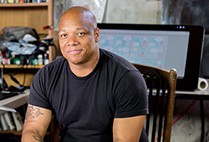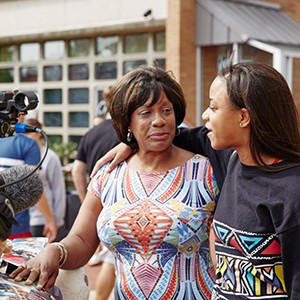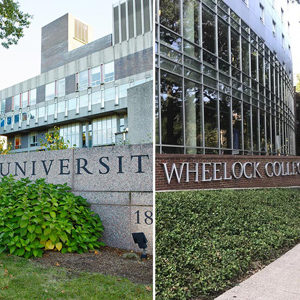Juana Aguirre grew up in rural El Salvador with no formal schooling, and she came to the United States in search of a better life. After 23 years working for the same East Boston company, she makes just over $14 an hour preparing meals for airline passengers. But she was determined to send her daughter, Stephanie Martinez, to college.
“She wants the best for me, for my future—she wants me to have a better life than she had,” Martinez (SAR’18) says, sitting beside her mother in their apartment in Chelsea, Mass., a few weeks before starting her sophomore year. “She works hard to support both of us. She’s very strong.”
When Martinez was in ninth grade, Aguirre found the help they needed to reach that goal of college in the nonprofit FUEL Education (Families United for Educational Leadership).
BU trustee Robert Hildreth, founder and president of International Bank Services, founded the organization in 2009 to help underserved Boston-area families whose members had never gone to college send their children on to higher education, making them the family’s first generation to attend college. This fall, FUEL announced it is changing its name to Inversant, derived from the Spanish word “invertir,” meaning “to invest,” and the English “conversant,” as in “well-versed.” The new identity was “the culmination of a conscious decision to seek a name that truly fits our focus of serving the families who most need guidance in the larger conversation about college finance,” says Hildreth.
Inversant offers families a financial incentive, but it also requires a long-term commitment, a combination that Hildreth believes helps families stay on the path to college. This fall, there are about 250 students in college from Inversant families, 5 of them at BU, all Latino: 3 freshmen and one junior in addition to Martinez.
“Inversant seems to have come across what we feel is the secret sauce, and that is that you focus on the parents before you focus on the kids,” says Hildreth, its executive director.
The nonprofit offers parents a deal: if they’ll start a modest college savings program and stick to it, Inversant will match the total when their student is ready to go off to college. There are minimums and maximums, which vary by community, but the amounts are modest, often less than $2,000. Many Inversant students attend schools with lower price tags, such as Bunker Hill Community College and Salem State University.
For four years, Aguirre was able to save small amounts every month, even after paying all their bills and sending money home to family in El Salvador. Last year, when her daughter was ready to enter BU, her savings earned a $1,500 match from Inversant.
“Her struggles meant a lot to me,” says Martinez, who left Chelsea High School with a 4.0 GPA and a slew of advanced placement courses on her transcript. “I saw kids who didn’t really care about their grades and their parents worked hard as well—how can you do that to them?”
More important than the money is the parents’ time, Hildreth says. “BU would love to double the diversity on campus. So would most colleges. But the students who can make it through to graduation aren’t many. BU is involved in a fierce competition for qualified African American and Latino students with other colleges, all willing to give big scholarships to those who apply. Politicians and educators who want to help should work to harness the motivation of low-income parents into an engine to improve schools.”
Aguirre attended mandatory monthly Saving Circle meetings to learn the ins and outs of the college application process and to talk about ways to keep her daughter motivated. The meetings included a meal and a chance to talk with other parents about problems they share. The Chelsea meetings were held in Spanish, a big help for her mother.
Families are recruited for Inversant through the Chelsea and Lynn school districts, as well as individual schools and after-school programs in Boston and Lynn. They tend to be minority, immigrant families with first-generation American children, typically ninth graders just beginning to think about college.
“There’s a tremendous amount of literature which says the parents are the great keepers of motivation,” Hildreth says in his small Inversant office on Copley Square. “Yes, it happens that you get a favorite teacher in the seventh grade who changes your life. But it happens seldom compared to the motivation you get day in and day out from your parents.”
The relationship with Inversant is just one of the ways BU is trying “to make a real commitment to diversity,” Hildreth says, naming other programs like Upward Bound, College Advising Corps, and the Posse Foundation. “I see BU really trying to come up with innovative solutions.”
Hildreth started FUEL with his own money (and he continues to plug gaps when needed), but it has since brought in more than $1 million from foundations, including the Boston Foundation, the Lloyd Balfour Foundation, and the Richard and Susan Smith Family Foundation.
Inversant students at BU are also eligible for the Century Challenge scholarships. Hildreth and his wife, Diane, contributed $3 million to the program to establish the Inversant scholarship. Martinez, for example, has received $10,000 a year through the challenge, as well as other financial aid, but still needed to take out loans to close the gap this year.
In her college admissions essay, Martinez wrote about the poverty she saw while visiting family in El Salvador and how it made her determined to use her education to help. At the College of Health & Rehabilitation Sciences: Sargent College, she is working toward a career in global public health.
“I have all these opportunities, and I have to take advantage of them,” she says, looking at her mother, “because she couldn’t do that.”
















































Amazingly proud to read about this young lady. I’m a proud Salvadorian myself who has lived true many difficult moments in this beautiful land of opportunities.